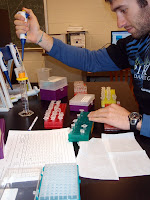My first analysis was to test the amount of ions (potassium, sodium, and chloride) present in the plasma. The level of ions found in said plasma can indicate the level of lactate/exhaustive exercise a fish has produced/undergone. Shortly after exercise there is an imbalance in cations (sodium, Na+ and potassium, K+) and anions (chloride, Cl-) where the cation concentrations are greater than the anions, causing the blood to become more acidic as pH decreases (known as metabolic acidosis).
 By using a flame photometer (black machine on right) and a chloridometer (grey machine on left) I can measure the amounts of these ions present in the plasma we collected. Though I have not yet officially run the data through any statistical software, I calculated the averages for all three ions for each treatment (including the six control fish): there is almost no variation amongst treatment groups and between treatments and the control fish. Essentially, this means that muskies are undergoing virtually the same level of exhaustive exercise/lactate production in each treatment AND under "normal" conditions. I hypothesized a significant difference would be noted between treatment groups and our control group, but I am not so sure we will find that when I run the statistics...
By using a flame photometer (black machine on right) and a chloridometer (grey machine on left) I can measure the amounts of these ions present in the plasma we collected. Though I have not yet officially run the data through any statistical software, I calculated the averages for all three ions for each treatment (including the six control fish): there is almost no variation amongst treatment groups and between treatments and the control fish. Essentially, this means that muskies are undergoing virtually the same level of exhaustive exercise/lactate production in each treatment AND under "normal" conditions. I hypothesized a significant difference would be noted between treatment groups and our control group, but I am not so sure we will find that when I run the statistics...Plasma cortisol is the other analysis I ran. Cortisol is the most common stress hormone produced by animals. It's hard to tell whether the cortisol concentrations we found are above, below, or equal to the average found in muskies because there appears to be no other muskie paper that has measured this hormone (not one that I have found yet at least). I can tell you that there is a striking difference between treatment groups and our control group which suggests that a stress response is initiated when the fish are hooked and played. Again, however, I have not run any statistics to determine if these observations are even signficant or merely anecdotal.
Happy holidays and happy New Year folks!


